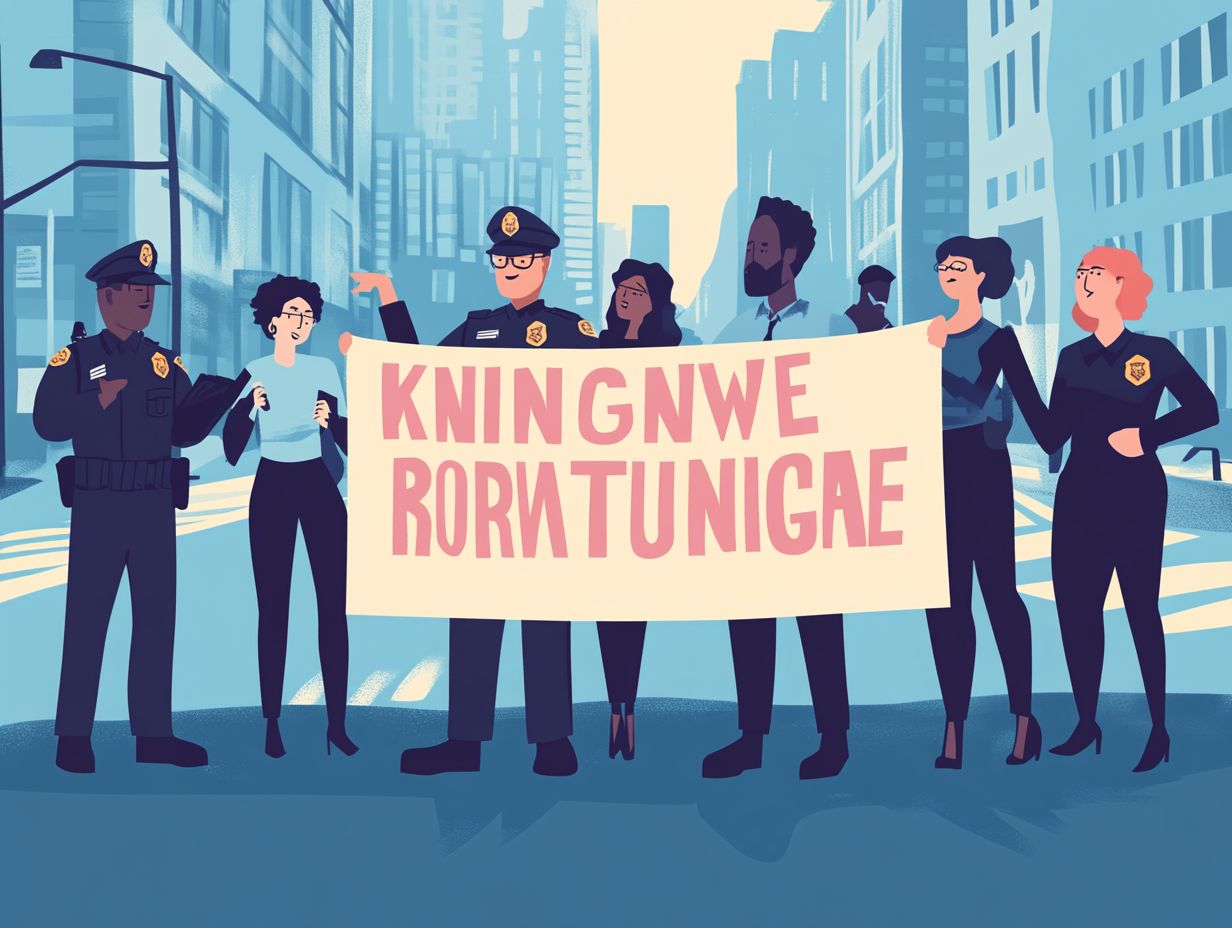Know Your Rights: Searches and Seizures
In a world where personal privacy and safety take center stage, it’s essential for you to understand your rights regarding searches and seizures.
This article delves into the key concepts of the Fourth Amendment, defining legal terms and clarifying what the Constitution actually protects. You ll discover when searches and seizures are permissible, uncover exceptions to the rules, and learn practical steps to take if you suspect your rights have been violated.
Get ready to empower yourself with knowledge that can change everything in critical moments!
Contents
- Key Takeaways:
- Understanding Searches and Seizures
- Fourth Amendment Rights
- When Searches and Seizures are Allowed
- What to Do if You Feel Your Rights Have Been Violated
- Know Your Rights: Tips for Interacting with Law Enforcement
- Frequently Asked Questions
- What are my rights during a search or seizure?
- Do I have to consent to a search?
- What is considered probable cause for a search?
- Can police search my car without a warrant?
- What is the difference between a search warrant and an arrest warrant?
- What should I do if I feel my rights have been violated during a search or seizure?
Key Takeaways:

- Know the difference between searches and seizures and how they are defined under the law.
- Familiarize yourself with your Fourth Amendment rights and what the Constitution says regarding searches and seizures.
- Understand the exceptions to the Fourth Amendment and what to do if you feel your rights have been violated.
Understanding Searches and Seizures
Understanding searches and seizures is crucial for knowing how the Fourth Amendment protects your rights against unreasonable intrusions by law enforcement.
The U.S. Constitution ensures that you are protected from government overreach. It strikes a delicate balance between the necessity for public safety and the preservation of your individual privacy.
This legal terrain covers various situations where police authority, judicial approval, and the legal benchmarks for lawful arrests or warrantless searches come into play.
Defining the Terms
Defining the terms related to searches and seizures is essential for understanding their implications on individual rights and law enforcement conduct.
Without a clear understanding of these concepts, you may overlook the delicate balance that must be maintained between public safety and personal liberties.
The term ‘search and seizure’ pertains to the procedures by which law enforcement can inspect private property for evidence of a crime. It is governed by strict legal standards to prevent arbitrary intrusions.
A crucial element in this framework is ‘reasonable suspicion,’ which means law enforcement must have a specific reason to believe a crime is occurring before taking action.
Such guidelines protect against unwarranted invasions of privacy. They reinforce that every individual has the right to feel secure in their person and belongings. This foundational concept shapes regulations that dictate police conduct and profoundly influences the broader legal landscape.
Fourth Amendment Rights
Your Fourth Amendment rights lay the foundation for personal privacy protections in the U.S. Constitution, shielding you from unreasonable searches and seizures.
Within this constitutional framework, you are entitled to a reasonable expectation of privacy regarding your personal property. This compels law enforcement to provide legal justification often via judicial approval before encroaching upon your private spaces.
Understanding these rights is essential for effectively navigating interactions with law enforcement and safeguarding the admissibility of evidence in legal proceedings.
What the Constitution Says

The U.S. Constitution clearly delineates protections against unreasonable searches through the Fourth Amendment. It establishes essential legal standards for law enforcement.
This amendment emphasizes the significance of personal privacy and stipulates that any search or seizure must be conducted with probable cause. To maintain accountability and protect individual rights, law enforcement agencies must obtain warrants specifying the premises to be searched and the items sought.
Landmark cases, such as Mapp v. Ohio, have strengthened these principles by excluding evidence obtained through unconstitutional methods. This underscores the government’s duty to respect citizens’ privacy. Understanding these protections is crucial as they defend against arbitrary intrusions and uphold the rule of law in a democratic society.
When Searches and Seizures are Allowed
Searches and seizures are permitted under specific circumstances defined by exceptions to the Fourth Amendment, allowing law enforcement to proceed without a warrant when certain criteria are met.
These exceptions encompass situations involving:
- a lawful arrest
- probable cause
- consent to search
- the plain view doctrine
Together, these elements create a nuanced understanding of law enforcement’s authority and the boundaries that exist to safeguard public safety.
Exceptions to the Fourth Amendment
There are several critical exceptions to the Fourth Amendment that allow for searches and seizures without a warrant, primarily centered around lawful arrest and probable cause. Understanding these exceptions is essential, as they profoundly influence how law enforcement interacts with individuals in various situations.
The search incident to arrest exception allows officers to search a person and their immediate surroundings without a warrant during a lawful arrest.
This is justified by the need to ensure officer safety and prevent the destruction of evidence.
Another scenario involves consent searches, where you voluntarily agree to let officers search your property. In this case, your consent negates the need for a warrant.
The exigent circumstances exception kicks in during emergencies, such as when officers believe evidence may be destroyed (urgent situations requiring immediate action), enabling them to act swiftly. These legal justifications underscore the necessity of police authority while also highlighting the importance of safeguarding individual rights within these exceptions.
What to Do if You Feel Your Rights Have Been Violated
If you suspect that your Fourth Amendment rights have been violated, take immediate action to protect your rights.
Understanding your rights within the framework of police authority and legal justification is vital for maneuvering through the intricacies of evidence suppression and asserting your individual liberties against potential misconduct.
Talking to a lawyer can open up new pathways for your rights and guide you toward the most effective course of action.
Steps to Take and Resources for Help

When you find yourself facing a potential violation of your Fourth Amendment rights, taking intentional steps can help safeguard your interests and ensure accountability.
It s essential to carefully write down every encounter with law enforcement capture details such as the time, location, and the behavior of the officers involved. This record can become invaluable evidence later on.
Seeking assistance from civil rights organizations can provide you with both support and tailored resources to address these legal challenges. Consulting with a legal expert who understands the intricacies of searches and seizures is crucial in grasping your rights and options.
Numerous resources are at your disposal, including legal aid societies and advocacy groups, which can guide you in navigating these complex situations with confidence.
Know Your Rights: Tips for Interacting with Law Enforcement
Understanding your rights when dealing with law enforcement is paramount for safeguarding yourself during encounters that may involve searches and seizures.
By understanding your individual rights, the boundaries of police authority, and the intricacies of consent to search, you empower yourself to assert your legal protections with confidence and clarity.
How to Protect Your Rights During a Search or Seizure
Protecting your Fourth Amendment rights during a search or seizure requires you to be well-informed about your legal entitlements and how to assert them effectively.
One key strategy is to ask whether law enforcement has a valid search warrant before any search begins. If they assert that they do, it’s crucial for you to request to see that warrant to verify its legitimacy.
Understanding the nuances of consent to search is equally important remember, you are not obligated to give consent, and refusing can help safeguard your rights.
It s wise to document the encounter, whether through notes or a recording, as this can provide an objective account that may prove invaluable later on.
Ultimately, being knowledgeable about these rights not only fortifies your individual liberties but also fosters a fairer interaction during police encounters.
Frequently Asked Questions
What are my rights during a search or seizure?

As a US citizen, you are protected against unreasonable searches and seizures by the Fourth Amendment. Law enforcement needs a valid reason and a warrant to search your property, except in certain cases.
Do I have to consent to a search?
You do not have to consent to a search without a warrant or probable cause. Clearly and politely state that you do not give permission for the search.
What is considered probable cause for a search?
Probable cause means there s a reasonable belief that a crime has happened or that evidence of a crime exists at a certain location. This belief must be based on actual facts, not just a hunch.
Can police search my car without a warrant?
Police might not need a warrant to search your car. This can happen if they have probable cause or if you are arrested and the car is within your control.
However, during a routine traffic stop, police cannot search your car without your consent or probable cause.
What is the difference between a search warrant and an arrest warrant?
A search warrant allows police to search a specific place for evidence of a crime. An arrest warrant gives police the right to arrest a specific person for a crime. Both types of warrants must be issued by a judge based on probable cause.
What should I do if I feel my rights have been violated during a search or seizure?
If you believe your rights were violated, stay calm and cooperate with the police. You have the right to remain silent and consult with an attorney.
Once things settle down, you can file a complaint or talk to a lawyer about your options for seeking justice.






